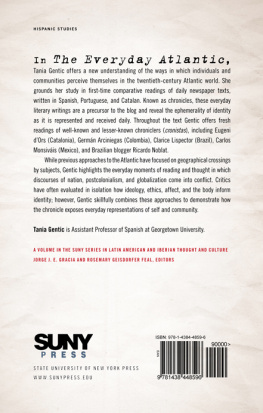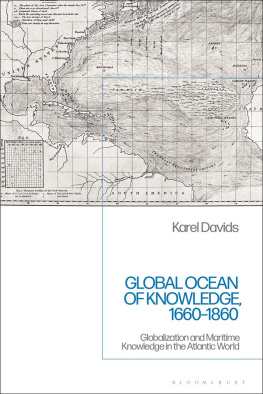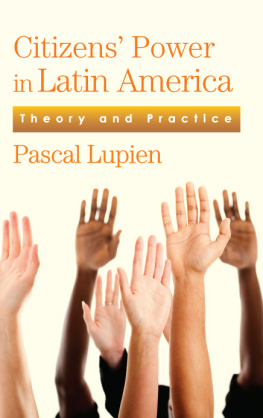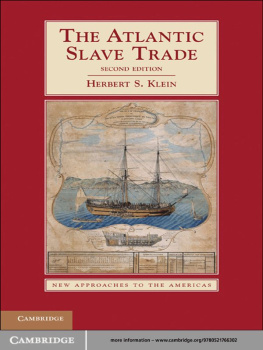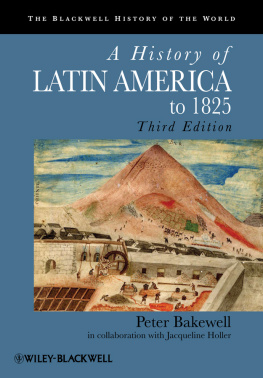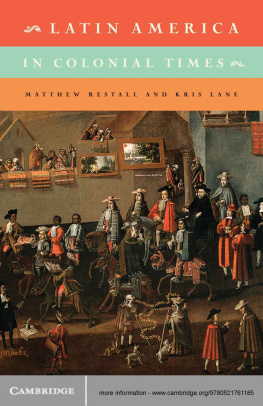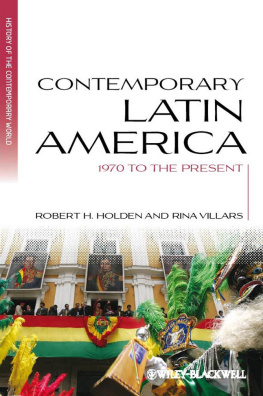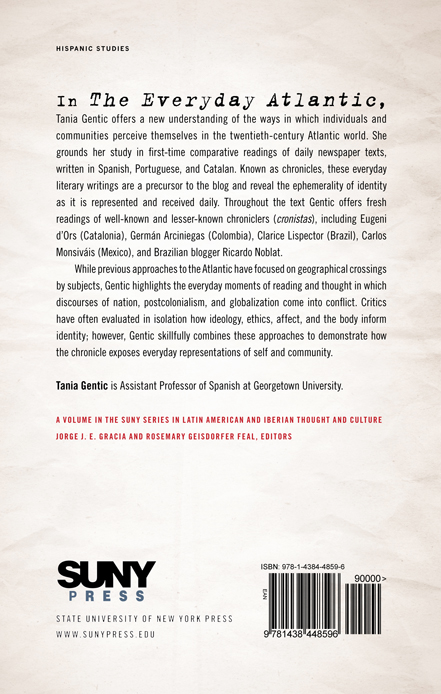THE
EVERYDAY
ATLANTIC
SUNY series in Latin American and Iberian Thought and Culture
Jorge J. E. Gracia and Rosemary Geisdorfer Feal, editors
The
Everyday
Atlantic
Time, Knowledge, and Subjectivity
in the Twentieth-Century Iberian
and Latin American Newspaper Chronicle
TANIA GENTIC
Published by State University of New York Press, Albany
2013 State University of New York
All rights reserved
Printed in the United States of America
No part of this book may be used or reproduced in any manner whatsoever without written permission. No part of this book may be stored in a retrieval system or transmitted in any form or by any means including electronic, electrostatic, magnetic tape, mechanical, photocopying, recording, or otherwise without the prior permission in writing of the publisher.
For information, contact State University of New York Press, Albany, NY
www.sunypress.edu
Production by Ryan Morris
Marketing by Fran Keneston
Library of Congress Cataloging-in-Publication Data
Gentic, Tania, 1978
The everyday Atlantic : time, knowledge, and subjectivity in the twentieth-century Iberian and Latin American newspaper chronicle / Tania Gentic.
pages cm. (SUNY series in Latin American and Iberian thought and culture)
Includes bibliographical references and index.
ISBN 978-1-4384-4859-6 (hardcover : alk. paper) 1. NationalismLatin AmericaHistory20th century. 2. NationalismSpainHistory20th century. 3. Group identityPolitical aspectsLatin AmericaHistory20th century. 4. Group identityPolitical aspectsSpainHistory20th century. 5. NewspapersSections, columns, etc.Political aspectsHistory20th century. 6. Newspaper readingPolitical aspectsHistory20th century. 7. TimePolitical aspectsHistory20th century. 8. SubjectivityPolitical aspectsHistory20th century. 9. SpainIntellectual life20th century. 10. Latin AmericaIntellectual life20th century. I. Title.
F1414.G388 2013
980.03dc23
2012049544
10 9 8 7 6 5 4 3 2 1
For my father, in memoriam
Contents
Illustrations
Acknowledgments
I am deeply indebted to my colleagues at Georgetown University, who have supported the publication of this book in numerous ways. I wrote much of this text with the aid of several grants awarded by the Graduate School of Arts and Sciences and the Faculty of Languages and Linguistics, for which I am grateful. I was also fortunate enough to present an early version of chapter 4 to the Americas Initiative run by John Tutino, where I received many helpful suggestions. I must also thank my chairs, Alfonso Morales and Gwen Kirkpatrick, as well as the many colleagues in the Spanish and Portuguese Department who have made working at Georgetown such a pleasure. Various research assistants throughout the years have also assisted me in a number of ways: thank you to scar Amaya Ortega, ngela Donate Velasco, Denise Kripper, Mara Jos Navia, Jovana ujevi, and most especially Marina Young, for your hard work on this project and others. I am also grateful for the services offered by the Office of Scholarly Publications, run by Carole Sargent.
Many wonderful readers, at Georgetown and elsewhere, have engaged with this work at various stages and provided indispensable suggestions for improvements. I have had fruitful discussions with others regarding the publishing process. My thanks for these dialogues go to Elisabeth Austin, Helen Blouet, Sara Castro-Klarn, Emily Francomano, Barbara Fuchs, Leslie Hinkson, Gwen Kirkpatrick, Francisco LaRubia-Prado, Adam Lifshey, Reinaldo Laddaga, Yolanda Martnez-San Miguel, Alejandro Mejas-Lpez, Erica Miller-Yozell, Barbara Mujica, Sara Nadal-Melsi, Joanne Rappaport, Eunice Rodrguez-Ferguson, Vernica Salles-Reese, Vivaldo Santos, Angelina Stelmach, Lisa Surwillo, Scott Taylor, Aparna Vaidik, Alejandro Yarza, and the anonymous readers who evaluated this manuscript.
The Ministerio de Educacin Nacional de Colombia allowed me to reproduce a photograph from the September 1936 edition of the Revista de las Indias, vol. 1.3, in chapter 3. Thank you as well to Francisco Mata Rosas, who graciously allowed me to republish as the epigraph to chapter 5 the photograph Balneario, from his Sbado de Gloria series. Raymond Mertens deserves special credit for his help formatting these images for publication. Additionally, I am grateful to the Revista Iberoamericana for granting me permission to include in chapter 5 portions of my article, El relajo como redencin social en Los rituales del caos de Carlos Monsivis. Revista Iberoamericana 73.21819 (2007): 21936.
I must also thank the many professors who inspired me over the years, first and foremost Carlos J. Alonso, whose intellectual rigor and mentorship have been invaluable to me; Michael Solomon, for his constant support; and my earliest mentors, Teresa Longo and Silvia Tandeciarz, who started me on the path to literary study.
Throughout this process I have been fortunate to have had the encouragement of more family and friends than I have the room to name here. Thanks to all of you.
Finally, my most heartfelt appreciation goes to David, whose faith in this book at times exceeded my own. For your love, support, and patience I will be forever grateful.
Introduction
Qu somnoliento conformismo hace que se siga recitando Carlos Monsivis-Juan Villoro-Pedro Lemebel-Martn Caparrs-Cristian Alarcn como si se intentara formar un canon con una muestra gratis? [What tiring conformity has made it so that we keep reciting Carlos Monsivis-Juan Villoro-Pedro Lemebel-Martn Caparrs-Cristian Alarcn as though we were trying to form a canon with a free sample?]
Mara Moreno, La crnica raabiosa (n.p.)
In [the oceanic] space, composed of the sedimented traces of uncharted histories, a hegemonic temporality intersects with other times, with the times of others [] We are brought into the presence of a contingent, temporal relation and into the multiplicity of the present, which is irreducible to its representation.
Iain Chambers, Maritime Criticism and Theoretical
Shipwrecks (682)
In November 1983, Joo Ubaldo Ribeiro published a crnica in Rio de Janeiros newspaper O Globo titled No pasarn! The text humorously details past and potential invasions of the island of Itaparica, located in Bahia, some one thousand miles from Rio. It jokingly describes Portuguese resistance to Dutch incursions on the island during the seventeenth century, as well as the short presence of Spanish soldiers there under the sixteenth-century reign of Felipe II. (This presence, Ubaldo writes, occurred while Portugal was under Spanish rule, so it did not actually count as an occupation.) He also discusses the English who, thankfully, were only in the area with Um navio pirata ou outro [a pirate ship here or there] as they focused their mission of bringing Civilizao e a Cultura Finally, he pokes fun at the French tourism that has recently taken over and turned the territory into a globalized

